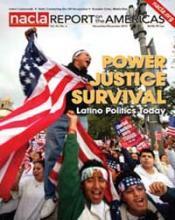Report
In exchange for their loyal votes, Latinos are expected to join what we can call the Obama–Democratic Party Consensus on immigration reform. This consensus requires that the president and his party build a more efficient immigration-control apparatus, while Latinos are expected to settle for symbolic appointments in government.
The challenges to building a successful coalition between Latinos and African Americans in Chicago shows us that the national discourse on citizenship, criminality, and immigration not only leads to anti-immigrant sentiments, but can impede mutual understanding and multiracial alliances.
On April 10, 2006, between 80,000 and 100,000 mostly Mexican immigrants participated in an unprecedented mass mobilization in the small southwest Florida city of Fort Myers. The mobilization shows that immigrant communities have the power and resources to mobilize on a mass scale, even in unexpected locations and without the help of foundations or "professional organizers."
A new generation of Salvadorans has taken up the struggle for social justice—both in El Salvador and in the United States. This new generation has a concrete legacy to draw upon: a transnational network and a particular model of organizing, one that emphasizes building human bonds with non-Salvadorans.
Organizations like the Indigenous Front of Binational Organizations (FIOB), a Los Angeles–based human rights group, act as binational political actors representing dynamic and influential spaces through which indigenous migrants are making their voices heard.
Measuring the success of Latino politics should be based on the degree of Latinos' incorporation into all levels of U.S. society—not just electoral victories. Neoliberalism poses the strongest barrier to incorporation.

